Remember when the future of search was on-demand television, and thousands of people could suddenly stream their favorite episodes any time they liked? This craving for at-will entertainment has only grown stronger as time passes and technology evolves, to the point that modern consumers no longer want to passively ingest commercials for products they’ll never want.
On a broader scope, many also don’t want to waste time wading through pages of Google results. Instead, they’re adopting a search-first consumer mindset and relying on the fastest, most accurate search methods – sometimes AI driven, sometimes escaping traditional search engines altogether – to find answers faster, which means brands need to pay attention to the following search behavior and adjust.
- A shopper’s search is one of the clearest indicators of consumer intent.
- The queries people enter online reveal what they want in real time, giving brands the opportunity to meet customers exactly when they’re making decisions.
- Search uncovers the actual language customers use, an insight that can shape more relevant messaging and content strategies.
- The increasing role of visual and video search shows that search is no longer just text based.
- Shifts in search trends highlight unmet needs and emerging interests, providing valuable input for product and service innovation.
- Search activity spans the entire customer journey, not just the final purchase, so it informs how brands can create content that supports awareness, consideration, and conversion.
- Understanding search behavior makes paid spend more efficient by focusing investment on high-value, intent-driven keywords rather than wasting budget on broad, low-return audiences.
- How people search gives brands a competitive edge by allowing them to respond faster to new trends, seasonal demand, or cultural shifts.
As a data-driven digital marketing agency at our core (amp) dedicated this past month to examining consumer search trends, the latest wave of search engine evolution, and how our clients can maximize brand searchability. Then, we distilled our findings into applicable strategies that are catered toward changing search behavior and increasing brand visibility in search. In short, this page is a playbook for the future of search, so if you’re looking for a TL;DR guide to boosting your branded search traffic, we’ve got you covered.
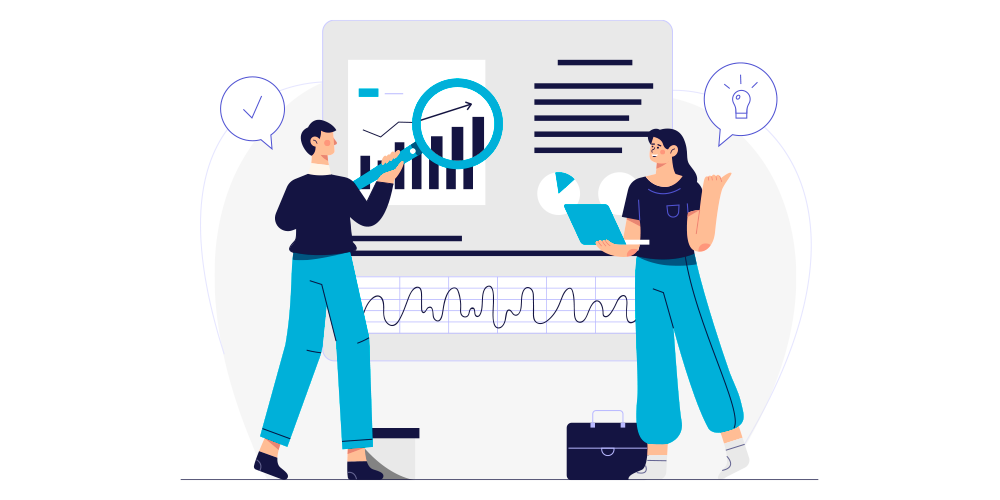
Latest Developments: Reddit, Google, and AI in Search
In the 2025 search arena, SEO and AI continue to duke it out for the titles of king and queen, while traditional TV ads stay firmly in the backseat. And, to spice up this competition even more, an unexpected challenger has entered the fight: Reddit. The popular user-driven Reddit platform is making a bid to oust Google as the internet’s top search engine, a challenge Google has not taken lying down.
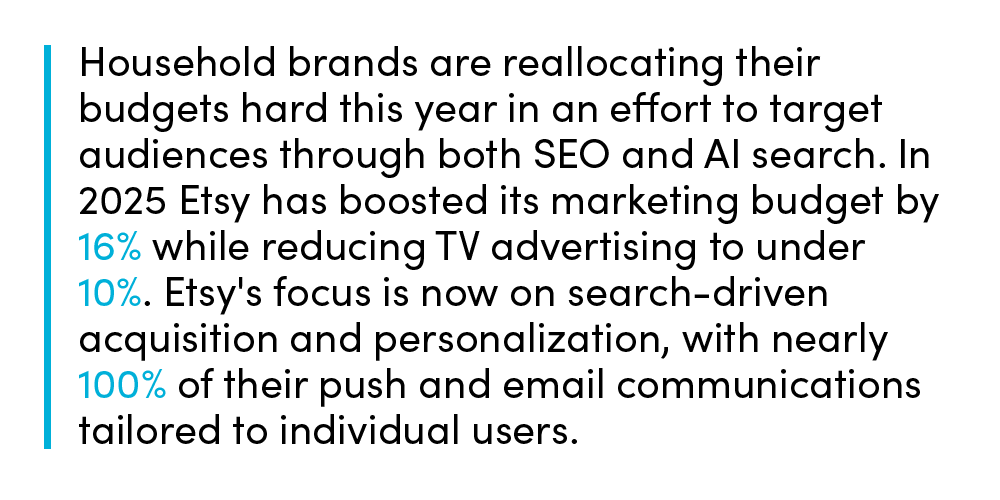
Detractors claim that any brand’s overreliance on search ads is concerning, particularly since Google-based click-through-rates have plummeted from 7.3% in March 2024 to 2.6% in March 2025. On the other end of the spectrum, we’re still seeing growth in U.S. search ad spending, which is a massive indicator that the recent presence of AI Overview isn’t closing the door on organic search optimization. In fact, U.S. paid-search revenue reached $102.9 billion in 2024 in direct relation to continued advertiser reliance on search channels for performance marketing. So, how do our (amp) experts feel about shifting budgets toward – or away from – search? The answer isn’t so black and white.
(amp)’s 2025 Take on Search Engine Evolution
(amp) is first and foremost a data-driven agency, so let’s begin with the basic facts.
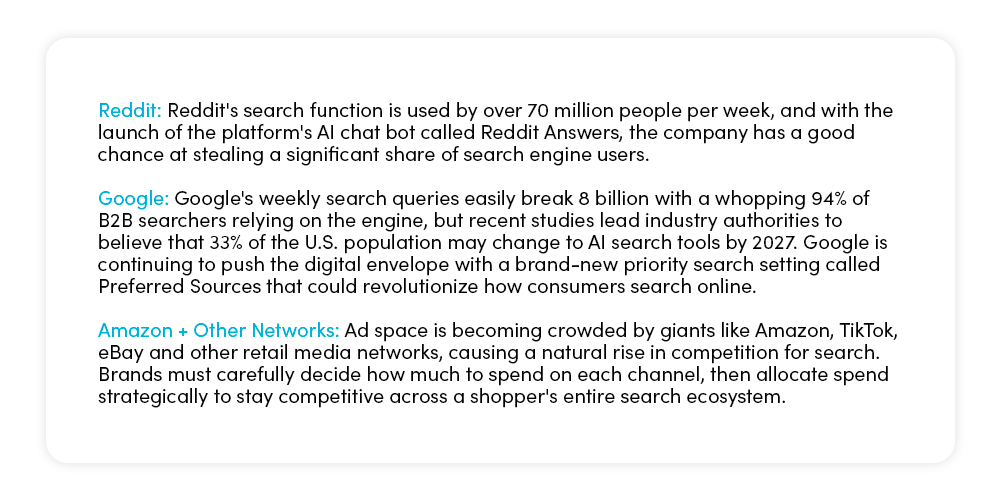
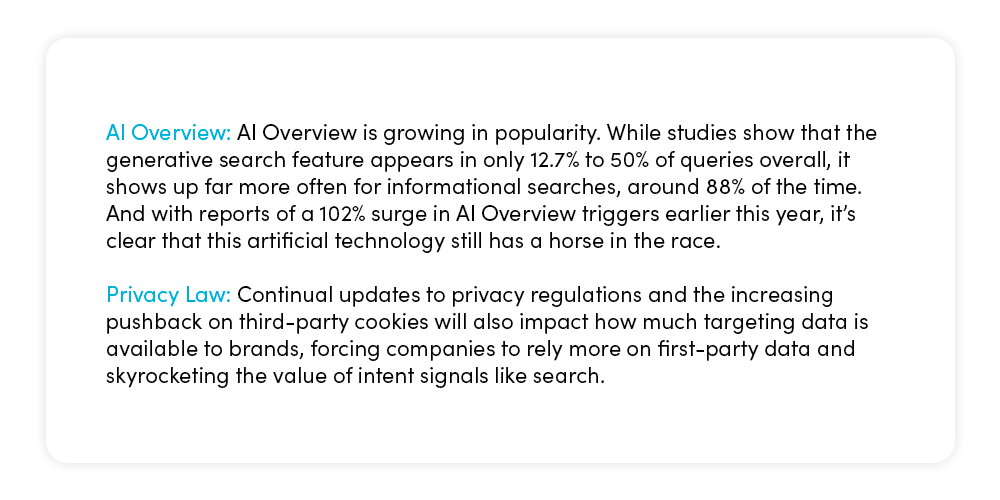
Upcoming Search Strategies for Brands
(amp) wants to make sure brands invest in effective search, but because it’s constantly evolving, keeping pace requires vigilance – and sometimes, the support of an outside marketing agency. We spoke with (amp) AI search and marketing expert Molly Kennedy for deeper insights about shifts in search strategies.
What should companies watch out for as search evolves in the future?
Molly: As search marketing evolves, companies need to be mindful of several major shifts that will reshape how people discover information and how brands show up. The rise of AI-driven search and answer means consumers may get answers without ever clicking through to a brand’s site, reducing traditional traffic but raising the importance of visibility within these new formats. Companies must also watch how zero-click searches continue to grow because Google or other platforms are providing results directly in the SERP. Now it’s harder to capture attention unless content is structured for featured snippets, local packs, or product listings.
How has the way consumers search changed in the past few years?
Molly: Voice search and conversational queries are more common now than ever, changing the way people ask questions. Today’s searches are longer, more natural, and more intent-driven, a change that’s pushing brands to rethink keyword strategies and optimize for context rather than just exact-match terms.
The Search Engine Evolution: (amp) Extrapolates Next Steps
The most exciting aspect of Reddit, Google, and AI Overview battling it out for the largest share of user search is the resulting innovations. Preferred Sources lets Google search users customize which news sites and blogs appear first in their search results and is a fantastic example of a new tech feature that could be expanded to a much broader marketing application.
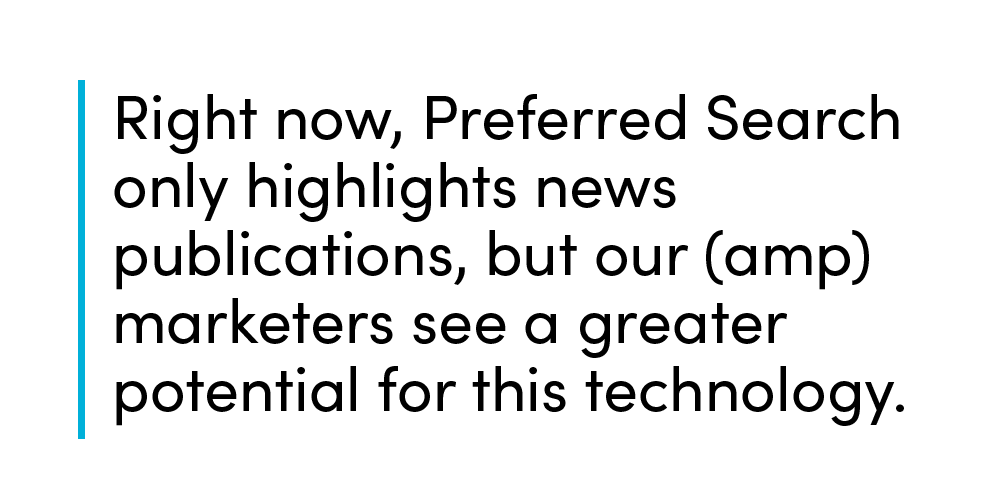
For example, should Google widen the capabilities of their Preferred Sources feature to include shoe and clothing brands, cookware lines, cell service providers, or literally any other industry, shoppers could theoretically pre-narrow their Google searches to only the brands they trust most. For marketers, this would translate to an even greater need to harness the power of both organic search optimization and AI-driven search engines.
